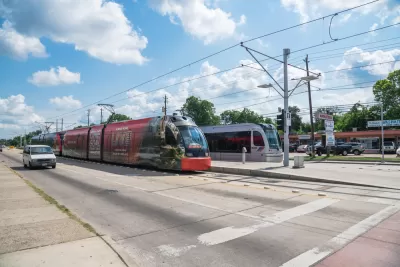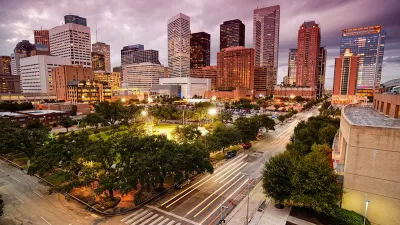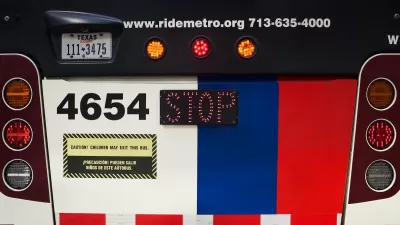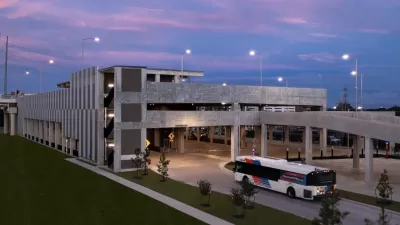The lull in commuter traffic during the pandemic gave Houston's transit agencies time to implement new projects and redesign downtown roads to better accommodate transit users.

Dug Begley reports on Houston's newest bus-only lanes, slated to cover over two miles of downtown streets "as part of a three-phase project to freshen the bus-only lanes managed by Metropolitan Transit Authority. Paint could be spread across four blocks of Travis by fall, though the total project will take up to a year, and up to $1.5 million."
According to Kimberly Williams, Metro’s chief innovation officer, "[t]he goal is to take advantage of the slowdown in traffic downtown while it lasts to freshen the existing bus lanes." Williams said the agency sees this "very much as a safety project, as well, because it creates structure among all the users downtown." The project "is one of many changes under construction, planned or being considered downtown as Metro, Houston Public Works and the Houston Downtown Management District accelerate work while many offices are unoccupied."
"City, downtown and Metro officials, meanwhile, are working on plans to stop allowing vehicles to share light rail lanes along Capitol and Rusk. If redesigned, only trains and, perhaps some buses, would occupy the lanes, turning them into transit byways of the street grid in the central business district." A 2019 report assessed the dangers inherent in sharing lanes and "suggested eliminating the shared lanes and allowing only trains to use them. Removing cars and trucks, however, will require further study of the safety benefits and the effects on traffic, including the need for turns across the tracks."
FULL STORY: What's red and white and spread across downtown? Pretty soon, transit-only lanes

Planetizen Federal Action Tracker
A weekly monitor of how Trump’s orders and actions are impacting planners and planning in America.

Maui's Vacation Rental Debate Turns Ugly
Verbal attacks, misinformation campaigns and fistfights plague a high-stakes debate to convert thousands of vacation rentals into long-term housing.

Restaurant Patios Were a Pandemic Win — Why Were They so Hard to Keep?
Social distancing requirements and changes in travel patterns prompted cities to pilot new uses for street and sidewalk space. Then it got complicated.

In California Battle of Housing vs. Environment, Housing Just Won
A new state law significantly limits the power of CEQA, an environmental review law that served as a powerful tool for blocking new development.

Boulder Eliminates Parking Minimums Citywide
Officials estimate the cost of building a single underground parking space at up to $100,000.

Orange County, Florida Adopts Largest US “Sprawl Repair” Code
The ‘Orange Code’ seeks to rectify decades of sprawl-inducing, car-oriented development.
Urban Design for Planners 1: Software Tools
This six-course series explores essential urban design concepts using open source software and equips planners with the tools they need to participate fully in the urban design process.
Planning for Universal Design
Learn the tools for implementing Universal Design in planning regulations.
Heyer Gruel & Associates PA
JM Goldson LLC
Custer County Colorado
City of Camden Redevelopment Agency
City of Astoria
Transportation Research & Education Center (TREC) at Portland State University
Jefferson Parish Government
Camden Redevelopment Agency
City of Claremont





























